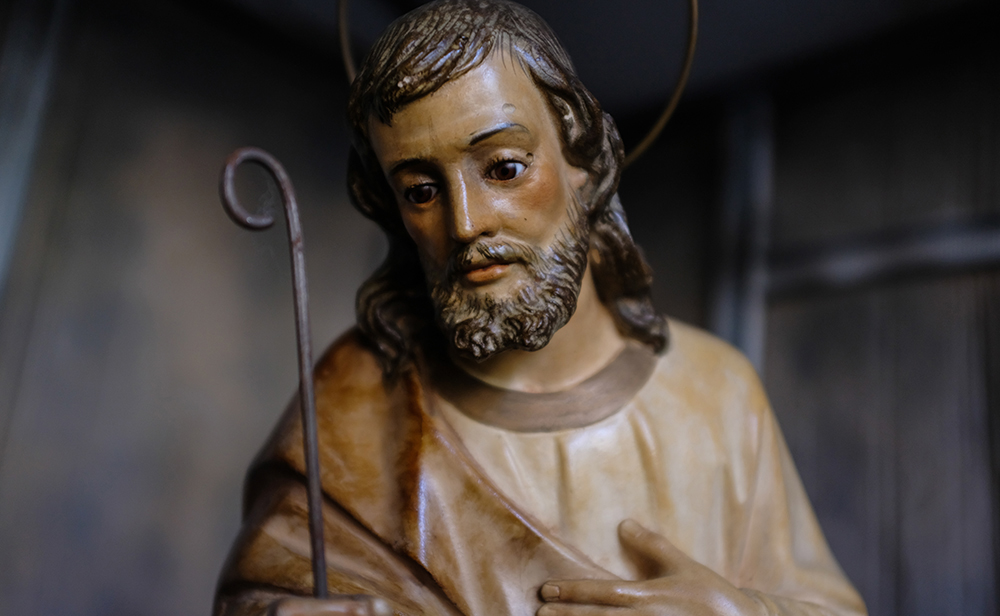What does it mean to be male?
When answering such questions, we turn to doctrine as mirrored in the lives of the saints. And so, the saints are incarnations, lived ideals, who can themselves reveal what it means to be male and female. In the case of masculinity, one of the great models to emulate after our Lord is St. Joseph.
St. Joseph reveals the masculine heart and in him we can see three aspects that are essential to masculinity: obedience, self-sacrifice and silence. While these aspects are not exclusive to men, they are more closely associated with masculine identity.
Obedience
When danger was about to befall Jesus from King Herod, St. Joseph protected his entire family by bringing them to Egypt until it was safe to return home. The theme of protecting the family is an important and strong theme for men. This is why St. Joseph is invoked as protector and guide for the entire Church. To look after your loved ones is deeply innate for men, but it can be twisted. Because we have sinned, we can manipulate these goods into evils. Hence, this role of protector must always be lived out through a heart of obedience. Obedience recognizes a mission greater than oneself and is willing even to put one’s own will and security to the side in order that others may live and flourish. In St. Joseph’s case, his ability to obey the command of the angels enables his protective heart to be lived out rightly. It requires humility, self-sacrifice and listening in order to understand what God asks. Obedience, too, recognizes that one is not the ultimate authority.
Self-sacrifice
One of the more interesting insights into St. Joseph is that his desire to reject Mary as his wife had nothing to do with her pregnancy outside marriage. As Fr. John Saward notes in his book, “Redeemer in the Womb,” St. Joseph’s desire to leave Mary results from his recognition of the mystery that is at work in her life, and his feeling too sinful to be close to such a mystery.
The angel comes to affirm that St. Joseph’s intuition is right, but reiterates that God is asking this of him anyways. Here the call of God comes once again and places the demand of love on St. Joseph. He could reject God, he could say “no,” he could say “my life’s plans do not include this” and simply run away. But his being a just man means that he would never want to disobey God, even if he didn’t feel like he understood what God’s call meant for him. The “yes” of St. Joseph, then — and all that it implies with the constant moving around to find new means to provide for this family that is almost thrusted upon him — is a sacrificial “yes.” He puts to the side his own plans, desires and pleasures in order to say “yes” to God. This involves a death to all he had planned, because saying “yes” to God always implies a death. For St. Joseph, though, the death always carries the promise of hope and new life with it. Thus all he does results from his knowing that in the call of God he has life, and that to say “no” to his plans in this life is, mysteriously, the way to say “yes” to life with God.
Silence
This characteristic is well known in St. Joseph, but is often ignored when talking about the masculine identity. It is true, within the realm of anthropology, that the masculine is often a more “active” archetype. Silence implies receptivity, humility and a certain passiveness. Thus, such a virtue can be dismissed as unimportant for men. Yet one of the purposes of the saints is that they, like grace, always interrupt our fallen vision to reveal what is real, what is of great importance. The silence of St. Joseph in Scripture is a testament that this virtue is deeply attached to the masculine heart.
The silence of St. Joseph reveals that men must always be creatures who listen to God: in order to be obedient to God’s call in their mission, to determine the right moment to act and to fulfill their nature as men. This listening quality of St. Joseph is most certainly one of the great qualities our Lord observed. His need to always listen to the voice of His Father reveals that St. Joseph’s silence and receptivity are not contrary to the masculine heart, but, rather, the core out of which a man acts. A life immersed in prayer is the secret for any man. While to act and to do is in man’s heart, it becomes a lifeless activism if it is not fed by a communion with God.
Father Harrison Ayre is a priest of the Diocese of Victoria, British Columbia. Follow him on Twitter at @FrHarrison. Read more from his Theological Anthropology 101 series here.

